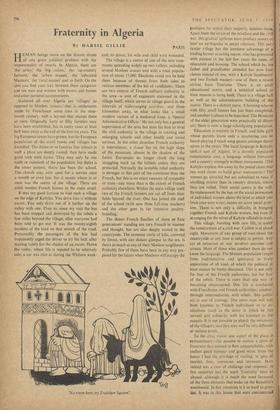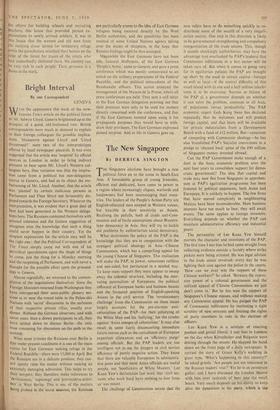Fraternity in Algeria
By DARSIE GILLIE PARIS HUMAN beings move on the distant slopes ,of any great political problem with the impersonality of insects. In Algeria, there are `the army,' the 'big colons,' the 'up-country farmers.' the 'urban masses,' the 'educated Moslems,' the 'rural masses' and so forth. On the spot you find your v■ ay between these categories and see men and women with names and homes and other personal accoutrements.
Scattered all over Algeria are 'villages' as opposed to Moslem 'douars,', that is, settlements made by Frenchmen some time in the nine- teenth century, with a lay-out that stamps them at once. Originally forty or fifty families may have been established, but in many cases at least half went away at the end of the first ten years. The big European towns have grown, but the European population of the small towns and villages has dwindled. The dozen or so families that remain in such a place are deeply rooted; they have made good with their farms. They may only be one tenth or twentieth of the population, but theirs is the street pattern, theirs has been the school. The church may only open for a service once a month or even less, but it stands where is or once was the centre of the village. There are solid, modest French houses in the main street.
It was my good fortune to visit such a village on the edge of Kabylia. You drive into it without escort. You only drive out of it farther up the valley with one. Even so, since my visit the bus has been stopped and destroyed by the rebels a few miles beyond the village, after everyone had been told to get out. It was the twenty-eighth incident of the kind on that stretch of the road. Presumably the passengers of the bus had impatiently urged the driver to try his luck after waiting vainly for the chance of an escort. Down the valley, where life is reputed to be relatively safe, a car was shot at during the Whitsun week- end; its driver, his wife and child were wounded.
The village is a centre of one of the new com- munes spreading widely up two valleys, including several Moslem douars and with a total popula- tion of about 15,000. Elections could not be held there because of threats from both sides to various members of the list of candidates. There are two centres of French military authority in the area—a unit of engineers stationed in the village itself, which serves as village guard in the intervals of wide-ranging activities; and three kilometres away, in what looks like a small modern variant of a mediceval keep, a 'Special Administrative Officer.' He not only has a general supervision of the area but does his best to rival the civil authority in the village in creating and enlarging schools and other health and social services. In the other direction French authority is intermittent; a douar lies on the high slope of the mountain, almost in the shadow of the forest. Europeans no longer climb the long straggling track up the hillside unless they are protected. Normally the invisible rebel authority is stronger in this part of the commune than the French, but this is no exact measure of sympathy or trust—any more than is the extent of French authority elsewhere. Within the main village itself two of the French farmers are cut off from their fields beyond the river. One has joined the staff of the school (with now three full-time teachers) and the other goes in for intensive poultry- breeding.
The dozen French families of three or four generations' standing are very French in manner and thought, but are also deeply rooted in the countryside. The immense circle of hills, crowned by forest, with one distant glimpse to the sea, is theirs as much as any of their Moslem neighbours. Probably few of them have been in any way pre- pared for the future when Moslems will occupy the 'No room here, try Trafalgar Square.' positions for which their majority destines them. Apart from the strain of the rebellion and the civil war, this gradual upthrust must produce sooner or later an earthquake in social relations. This par- ticular village has the immense advantage of a leading farmer as acting mayor, who has promoted with passion in the last few years the cause of education and housing. The school which he, his father and grandfather attended has now four classes instead of one, with a Kabyle headmaster and two French masters—one of them a recent arrival from Touraine. There is an adult educational centre, and a technical school to train masons is being built. There is a village hall as well as the administrative building of the 'Prairie. There is a distria nurse. A housing scheme with fifty small houses has just been completed, and another is about to be launched. The Moslems of the older generation were practically all illiter- ate; there is now a large schoolgoing population. Education is entirely in French, and little girls whose parents know only a smattering can be heard playing French song games amongst them- selves in the street. The local language is Kabylc. spok.:n east of Algiers, in a densely populated mountainous area, a language without literature and a country strangely without monuments. (The Kabyles explain this away by the proud claim that you need slaves to build great monuments.) The' women go unveiled but are submitted to rules if anything stricter than in country districts, where they are veiled. Their social centre is the well.
Its replacement by the tap, or the social promotion of individual women above the level at which you fetch your own water, causes an acute social prob- lem. There is not only a difficulty in bringing together French and Kabyle women, but even of arranging for the wives of Kabyle officials to meet.
This village, bursting with new life, is under the constrictions of a civil war. Curfew is at about eight. Movement of any group of men about the countryside at any time is subject to .permit. Any act of terrorism or war involves searches and arrests. Most of those who conduct them do not know the language. The Moslem population ranges from traditionalism and ignorance to lively aspirations of all kind, of which the political at least cannot be freely discussed. This is not only for fear of the French authorities, but for fear of the rebels. There is more than one was becoming becoming emancipated. One life is conducted with Frenchmen and French authorities; another, through intermediaries, with rebels. Any public act is one of courage. The same man will feel both loyalties to French individuals or to in- stitutions (such as the army in which he has served) and solidarity with his kinsmen in the maquis. It is not, possible to plumb the reticences of the villagers, and they may well be very different at various levels.
To the stray visitor one aspect of the place is extraordinary—the passion to sustain a spirit of fraternity that seemed to flow unquenchably, with endless good humour and good sense. from the house I had the privilege of visiting; in spite of murder, fear, repression and unreason. Here indeed was a case of challenge and response; in few countries has the word 'fraternity' been so abused, although it is much the most favoured of the three elements that make up the Republic' watchword. In few countries is it so hard to prac- tise. It was in this house that were concentrated the efforts for building schools and recruiting teachers; this house that provided patient ex- plantations to newly arrived soldiers. It was to this. house that the women and old men from l he outlying &mar turned for temporary refuge hile the parachutists searched their homes on the edge of the forest for traces of the rebels who had undoubtedly sheltered there. No country can he very rich in such people. Their presence is a flame in the murk.







































 Previous page
Previous page